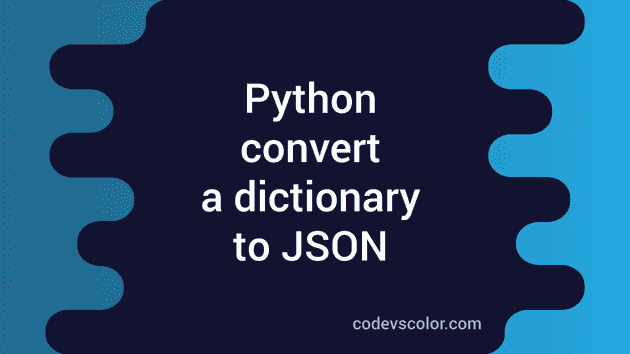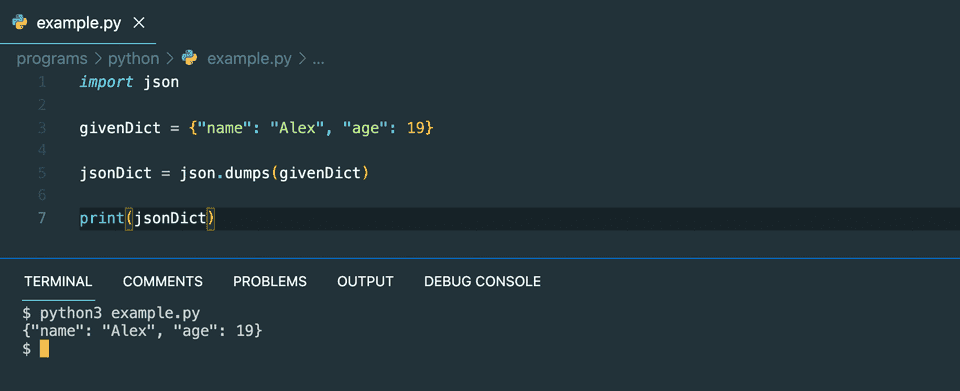How to convert a dictionary to JSON in python:
In this post, we will learn how to convert a dictionary to JSON in python. JSON or JavaScript Object Notation is a popular format that is used widely for interchange and store data.
It has many advantages like it is lightweight, it is easy for human and programming languages to read etc.
A JSON object can have key-value pairs and an array of values.
For example, the below is a JSON object:
{"name" : "Alex", "age" : 10}For this object, two keys are there name and age and values for name is Alex and for age is 10.
What is dictionary in Python:
Dictionaries are use to store key-value pairs in Python. We can create a dictionary by putting all key-value pairs within a curly braces. For example:
givenDict = {"name": "Alex", "age": 19}givenDict is a dictionary.
We can’t have any duplicate keys in python.
Converting dictionary to JSON in python:
We can convert a dictionary to a JSON object easily in python. Python provides a module called json that provides different methods to work with JSON values.
It provides a method called dumps, that can be used to convert a dictionary to JSON. This method returns the converted JSON value.
Python example program to convert dictionary to JSON:
Let’s take a look at the below program:
import json
givenDict = {"name": "Alex", "age": 19}
jsonDict = json.dumps(givenDict)
print(jsonDict)For this example,
- We are using import json to import the json module. dumps method is defined in this module.
- givenDict is the given dictionary.
- We are using json.dumps to convert the dictionary to a JSON and that value is stored in jsonDict.
- The last line is printing the JSON data.
If you run this, it will print the below output:
{"name": "Alex", "age": 19}Pretty print a JSON:
We can pass one more parameter index to json.dumps with a non-negative value. This is an integer value and it defines the indent level to use for pretty-print the JSON.
For example,
import json
givenDict = {"name": "Alex", "age": 19, "grade": "A"}
jsonDict = json.dumps(givenDict, indent=4)
print(jsonDict)It will print:
{
"name": "Alex",
"age": 19,
"grade": "A"
}indent with None will make the most compact JSON.
And, if you pass 0, it will only insert newlines as like below:
{
"name": "Alex",
"age": 19,
"grade": "A"
}Sorting the keys of a JSON:
We can also sort the keys of a JSON by using dumps. For that, we have to pass another parameter called sort_keys. This is False by default. If we pass True, it will sort the keys of the JSON.
For example,
import json
givenDict = {"name": "Alex", "age": 19, "grade": "A"}
jsonDict = json.dumps(givenDict, indent=4, sort_keys=True)
print(jsonDict)It will sort the keys of the final JSON and print the data as like below:
{
"age": 19,
"grade": "A",
"name": "Alex"
}Writing Dictionary to a JSON file:
There is another method called dump defined in the json module. This method can be used to write the content of a dictionary to a file. It can be a JSON file or any other file.
This method takes two parameters: the first one is the dictionary that we need to convert and write and the second one is the pointer to the file.
For example:
import json
givenDict = {"name": "Alex", "age": 19, "grade": "A"}
with open("data.json", "w") as f:
json.dump(givenDict, f)It will print the content of givenDict to a file data.json.
You can also change the indent and sort the keys similar to dumps.
import json
givenDict = {"name": "Alex", "age": 19, "grade": "A"}
with open("data.json", "w") as f:
json.dump(givenDict, f, indent=4, sort_keys=True)You might also like:
- 5 different ways to print multiple values in Python
- Python numpy interp method example
- How to use empty_like in numpy with example
- 3 ways to concatenate tuple elements by delimeter in Python
- How to iterate and print an array in reverse order in Python
- How to use Python numpy.all method with examples


